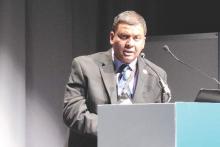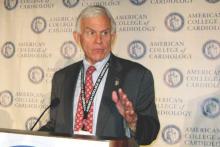Dr. Gordon F. Tomaselli, an electrophysiologist, professor of medicine, and chief of cardiology at Johns Hopkins University in Baltimore, envisions a similar target population: “People who cannot or will not take warfarin or a new oral anticoagulant,” he said. He cited AF patients with a CHA2DS2-VASc score of at least 2, but perhaps in most cases for serious Watchman consideration with an even higher CHA2DS2-VASc score and hence an even greater stroke risk, as well as an inability to received optimal anticoagulant-drug treatment.
“Right now Watchman fills a small but important niche. If a patient is eligible for an oral anticoagulant and not especially averse to taking one I’d go with that, especially if the patient does not closely resemble those enrolled in the trials, because our experience with NOACs is quite good. But once we get good at placing Watchman and our experience grows, you’ll start to see the indications expand,” he predicted.
Dr. Saibal Kar, director of interventional cardiology research at Cedars-Sinai Medical Center in Los Angeles and a lead collaborator on the Watchman pivotal trials, agreed that for the time being as well as the foreseeable future Watchman remains a “second-line” option for patients who clearly fail the first line of treatment with warfarin or a NOAC (although Dr. Kar still prefers warfarin). “I absolutely start patients on warfarin and see how they do” and then he offers Watchman to patients who “for various reasons cannot take warfarin or a NOAC,” which could mean serious bleeding episodes or a clear pattern of noncompliance, Dr. Kar said in an interview. Some patients also opt for Watchman because of lifestyle issues, such as a history of falls, or patients who engage in potentially bruising sports such as skiing, he said.
Dr. Kar highlighted the evidence that with longer follow-up, Watchman is not only comparable to warfarin for safety and efficacy, the endpoint specified in the pivotal trials, but also showed a strong signal for long-term superiority in the 4- and 5-year results from PROTECT AF. “For a lot of patients who have challenges [with bleeding complications] Watchman is a great option. When you prevent life-threatening bleeds, it translates into a mortality benefit.”
A cautionary view for the current role of Watchman came in a June editorial written by two physicians at Beth Israel Deaconess Hospital in Boston, who warned that in selected patients Watchman “may be safe, effective, and preferable to chronic warfarin thromboembolic prophylaxis in AF, but at this point many questions surrounding its safety and long-term efficacy remain unanswered” (J Am Coll Cardiol. 2015 June 23;65[24]:2624-7). Dr. Jonathan W. Waks and Dr. Warren J. Manning went on to say in their commentary that “at this point in time, it appears that patients treated with Watchman may pay early (procedural complications) and may also possibly pay later (late thromboembolism).”
In a reply to this critique, Dr. David R. Holmes Jr., professor of medicine and an electrophysiologist and interventional cardiologist at the Mayo Clinic in Rochester, Minn., and developer of the Watchman device, countered that while extremely long-term outcomes from Watchman, beyond 5 years, are not yet available, the long-term consequences of extremely prolonged chronic anticoagulation that continues for a similarly extended period also remain undocumented. He noted that hemorrhagic stroke poses the greatest stroke danger to patients maintained on anticoagulant therapy, but the meta-analysis of Watchman results that he and his associates published in June – the article that was the subject for the comment by Dr. Waks and Dr. Manning – showed a 78% relative risk reduction in hemorrhagic strokes among Watchman recipients compared with control AF patients who received warfarin (J Am Coll Cardiol. 2015 June 23;65[24]:2614-23).
Dr. Holmes acknowledged that patients treated with Watchman and no anticoagulant can develop ischemic strokes from causes aside from clot formation in the LAA. But he stressed that the meta-analysis he published in June showed a striking 52% relative decrease in cardiovascular or unexplained deaths during and average 2.7 years of follow-up compared with the control patients treated with warfarin.
“It is extraordinarily uncommon to have this magnitude of improved survival in a relatively small number of patients,” and the survival benefit was consistent across both randomized Watchman trials as well as in both continued access cohorts that followed each of the two trials, Dr. Holmes said in an interview.
“I fully accept that we don’t have data beyond 5 years, but the data from PROTECT AF out to 5 years showed no evidence of late strokes or other adverse events,” said Dr. Vivek Y. Reddy, professor of medicine and director of the cardiac arrhythmia service at Mount Sinai Hospital in New York. “In fact, the longer you follow these patients [who received Watchman], the more benefit you see, because these patients are not on an oral anticoagulant long term. Concern about long-term outcomes “is not borne out in the data,” said Dr. Reddy, another leader of the team of interventionalists and electrophysiologists who ran the Watchman trials.



